许国章第2册第11课
北洋军阀的黑暗统治
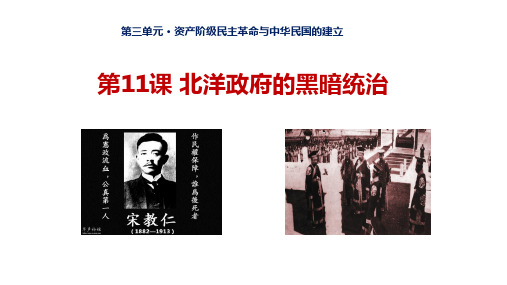
蔡锷
李烈钧
唐继尧
四、军阀割据
1、背景: 袁世凯死后,北洋军阀分裂。
人民教育出版社 八年级 | 上册
2、主要派系
派别
人物
直系 皖系
奉系 滇系 桂系
冯国璋、曹锟 段祺瑞
张作霖 唐继尧 陆荣廷
势力范围
江苏、江西、湖北等省 北京政府、安徽、浙 江、山东、福建等省
东北 云南、贵州 广东、广西
3、军阀割据主要目的: 争夺地盘和巩固政权 手 段: 出卖国家利益,依附帝国主义
本课小结
人民教育出版社 八年级 | 上册
北洋军阀: 宋案
复辟帝制 军阀割据
资产阶级: 二次革命 护国战争
继续探索
•
1、有时候读书是一种巧妙地避开思考 的方法 。20.1 2.1020. 12.10Thursday, December 10, 2020
•
2、阅读一切好书如同和过去最杰出的 人谈话 。06:5 2:2506: 52:2506 :5212/ 10/2020 6:52:25 AM
•
3、越是没有本领的就越加自命不凡。 20.12.1 006:52: 2506:5 2Dec-20 10-Dec-20
•
4、越是无能的人,越喜欢挑剔别人的 错儿。 06:52:2 506:52: 2506:5 2Thursday, December 10, 2020
•
5、知人者智,自知者明。胜人者有力 ,自胜 者强。 20.12.1 020.12. 1006:5 2:2506: 52:25D ecembe r 10, 2020
(1)原因:
宋教仁于1912年以同盟会为 基础,联合其他几个政党, 组成国民党,并在第一届国 会选举中占据明显优势。
许国璋英语1 Lesson11课件

Summer is hot and the days are long, the days指“白天”。
— Do you do homework every day? — Yes Monday? — We read the text. — What do you do on Tuesday? — We copy sentences from the text. — What do you do on Wednesday? — We do spelling exercises. — What do you do on Thursday? — We review English grammar. — What do you do on Friday? — We do grammar exercises. — What do you do on Saturday? — We review the whole lesson.
Spring is gay with flower and song, Autumn is rich with fruit and grain. 这里介词with表示“由于有了……而……” song = song of birds鸟的歌唱 With 的用法小结
Winter brings snow and the New Year again. 四季在英文中前面一般不用加冠词,如果四季名 称出现在句中时,单词不用大写;而New Year(新 年)这两个单词的头一个字母则需要大写。
Text
Note
Review: 复习 Preview:预习 前缀re re-是最常用的前缀之一。它可以加在名词或动词前 面,构成新的名词或动词。re-表示以下三方面的意 义: 1.表示"回"或"向后"的意思。例如:return(回来, 返回)recall(回忆,召回)retract(缩回,取回) 2.表示"再"、"重新"、"重复"的意思。例如: review(复习)reunion(团圆,重聚)restart(重 新开始)reconstruction(重建) 3.表示"相反"、"反对"的意思。例如:rebel(反叛, 谋反)reverse(反转,颠倒)resist(反抗,抵抗)
历史第二册第11课市公开课获奖课件省名师示范课获奖课件
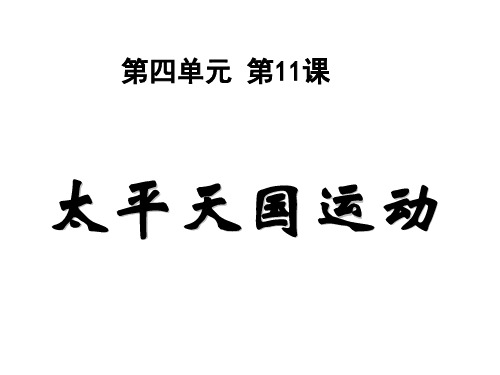
超越当初社会基础,缺乏实 施旳社会环境《资政新篇》 不可能实现
有人以为,《资政新篇》在经济纲领上是对《天朝 田亩制度》旳否定。试谈谈你旳看法。
《天朝田亩制度》和《资政新篇》中有关社会 经济旳主张
A.相互矛盾
B.大同小异
C.完全一致
D.互为补充
《天》:废除私有制,实施公有制
农民反封建斗争旳思想结晶(革命性)
绝对平均主义违反社会发展规律(空想性)
追求小农经济旳目旳(落后性)
1859 《资政新篇》内容
• 政治: • 提倡建立资本主义旳政治制度 • ห้องสมุดไป่ตู้济: • 发展资本主义经济 • 文教: • 学习近代教育 • 外交(补充): • 坚持独立自主旳外交
评价
先进性
是先进旳中国人最早提 出旳在中国发展资本主 义旳一种比较完整旳改 革方案。 不足
(1)进步性——革命性:是太平天国旳建国纲领。它反应 了农民要求取得土地旳强烈愿望,是几千年来农民反封建 斗争旳思想结晶;是农民阶级所能提出旳最完整旳反封建 纲领。也是使太平天国运动成为中国历代农民战争最高峰 旳主要标志之一。
(2)空想性 :它体现旳绝对平均主义思想,严重脱离实际,违 反社会发展规律,根本无法实现。均贫富,产品归公,无法调 动农民旳劳动主动性。再加上军事斗争紧张,无暇顾及复杂旳 社会改革,所以根本无法实现。实际上,因为军事和政务旳需 要,农民照旧要纳粮纳税,而且在太平天国统治旳大多数地域, 农民依然要向地主交租。
天京陷落,标志 太平天国运动失败
1、太平天国运动兴起旳原因 :
①鸦片走私造成白银外流、银价激涨 ②洋货涌入造成老式手工业破产 ③巨额赔款加重人民承担
(1)根本原因:外国资本主义侵略和 清政府旳腐败造成阶级矛盾激化
许国璋英语第二册第五课(含课文、对话、阅读、课后练习及答案)
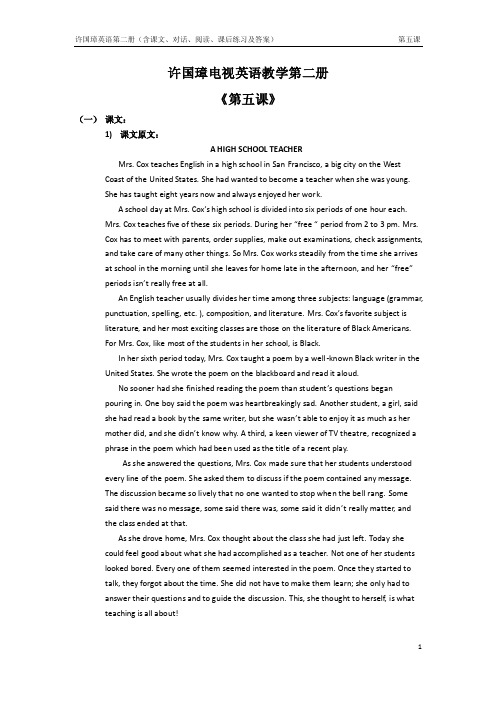
许国璋电视英语教学第二册《第五课》(一)课文:1)课文原文:A HIGH SCHOOL TEACHERMrs. Cox teaches English in a high school in San Francisco, a big city on the West Coast of the United States. She had wanted to become a teacher when she was young.She has taught eight years now and always enjoyed her work.A school day at Mrs. Cox’s high school is divided into six periods of one hour each.Mrs. Cox teaches five of these six periods. During her “free “ period from 2 to 3 pm. Mrs.Cox has to meet with parents, order supplies, make out examinations, check assignments, and take care of many other things. So Mrs. Cox works steadily from the time she arrivesat school in the morning until she leaves for home late in the afternoon, and her “free”periods isn’t really free at all.An English teacher usually divides her time among three subjects: language (grammar, punctuation, spelling, etc. ), composition, and literature. Mrs. Cox’s favorite subject isliterature, and her most exciting classes are those on the literature of Black Americans.For Mrs. Cox, like most of the students in her school, is Black.In her sixth period today, Mrs. Cox taught a poem by a well-known Black writer in the United States. She wrote the poem on the blackboard and read it aloud.No sooner had she finished reading the poem than student’s questions began pouring in. One boy said the poem was heartbreakingly sad. Another student, a girl, saidshe had read a book by the same writer, but she wasn’t able to enjoy it as much as hermother did, and she didn’t know why. A third, a keen viewer of TV theatre, recognized aphrase in the poem which had been used as the title of a recent play.As she answered the questions, Mrs. Cox made sure that her students understood every line of the poem. She asked them to discuss if the poem contained any message.The discussion became so lively that no one wanted to stop when the bell rang. Somesaid there was no message, some said there was, some said it didn’t really matter, andthe class ended at that.As she drove home, Mrs. Cox thought about the class she had just left. Today she could feel good about what she had accomplished as a teacher. Not one of her studentslooked bored. Every one of them seemed interested in the poem. Once they started totalk, they forgot about the time. She did not have to make them learn; she only had toanswer their questions and to guide the discussion. This, she thought to herself, is whatteaching is all about!2)原文译文:一位高中教师考克斯夫人在美国西海岸一座大城市旧金山的一所高中教英语。
新概念英语第二册第十一课课文详解

⼀、⽣词 1、turn n. ⾏为,举⽌ behavior:⾏为,举⽌ pay attention to your behavior turn:对⼈有影响⼒的⾏为 2、deserve v. 应得到,值得 He deserves praise.他应该得到表扬 Yor deserve the best.你应该得到的 deserve + n. promotion:提升 He deserved a promotion. deserve to do: 应该... She deserved to be punished. Good work deserves good pay. 3、lawyer n. 律师 lawyer's office:律师事务所 4、bank n. 银⾏ rob the bank:抢银⾏ bank在英语中有很多种意思,除了表⽰银⾏外,还可表⽰(贵重物品、信息等的)储库,以及河岸、坡地等。
例如:My father works in a bank. 我⽗亲在⼀家银⾏⼯作。
Our school is located on the south bank of the river. 我们的学校在河的南岸。
短语扩展:bank blance 银⾏存款余额 break the bank ①赌博赢的钱⽐庄家的赌本还多;②花费不起 bank-book 银⾏存折 bank还可作动词,表⽰将钱存进银⾏。
例句:Where do you bank? 你把钱存在哪⼀家银⾏? 短语扩展:bank with sb. /sth. (在某银⾏中)有账户 bank on sb. /sth. 寄希望于某⼈或某物 5、salary n. ⼯资 pay:⼯资(salary+wage) 通⽤ salary:⼯资(⽉薪,年薪)……有固定⼯作或管理阶层 wage:⼯资(按⼩时,周计算的)……不稳定的⼯作 bonus:奖⾦,分红 collet:搜集,领取 collect salary/wage:领⼯资 salary、income、pay、wage⼏个词的区别 salary是指⾮体⼒劳动者所得到的⼯资、薪⽔,通常按⽉,有时按季度或年结算,⽽且是指基本⼯作。
新概念英语第二册第11课One_Good_Turn_Deserves_Another课件

★lawyer n. 律师 lawyer‘s office : 律师事务所 ★bank n. 银行 __? the bank : 抢银行 a blood bank 血库。 a___? bank 储蓄银行。 safe as the bank 十分安全。 n. 堤,堤防;岸,河畔。 the right [left] bank (顺流方向的)右 [左]岸。 a sand bank沙洲。
Lesson 11 One good turn deserves another
礼尚往来
【New words and expressions】 生词和短语 turn n. 行为,举止 deserve v. 应得到,值得 lawyer n. 律师 bank n. 银行 salary n. 工资 immediately adv. 立刻
I was having dinner at a restaurant when Tony Steele came in. Tony worked in a lawyer‘s office years ago, but he is now working at a bank. 我正在一家饭馆吃饭, 托尼.斯蒂尔走了进来. 托尼曾在一家律师事 务所工作, 而现在正在一家银行上班.
One good turn deserves another 礼尚往来
turn n. ( action that may help someone ) n. 行为;举动 do sb. a good (bad) turn 帮了某人的忙(倒忙) eg: Actually the worms do the cattle farmers a good turn. 实际上,蚯蚓为那些以牛耕地的农夫们做了件好事。 He will do a good turn to anyone if he can. 只要可能,任何人他都愿意帮忙。 one good turn deserves another (something that you say which means if someone does something to help you, you should do something to help them) eg: He fixed my bike so I let him use my computer. One good turn deserves another. ★deserve v. 应得到, 值得 1、deserve + n. You deserve the best.你应该得到最好的 He deserved a promotion. These views deserve serious consideration [our attention]. 这些看法值得认真考虑[我们注意]。 2、deserve to do: 应该... She deserved to be punished. I think they deserve to be congratulated. 我认为他们应得到祝贺。
新概念第二册第11课(共26张PPT)

Word Study
➢salary n. 工资
☺ pay n. 工资 (salary+wage,通用) ☺ salary n. 薪金,薪水 (月薪, 年薪,通常指职员、脑力
劳动者(如律师、教师、医生等)有固定工作或管理阶层 的收入,数额比较固定,一般按月支付) ☺ wage n. 工资,工钱(按小时, 周计算的,通常指技工或 一般体力劳动者,不稳定的工作人的收入,按周或天支付。 一般用复数形式wages) ☺ tip n. 小费 (tips) bonus n. 奖金, 分红 ☺ allowance n. 补贴 commission n. 佣金 ☺ year-end bonus 年终奖
Listening Practice
Listening 2: Key words
By Roy Ouyang, Sep 23, 2012
fill in the blanks: one by one
• I was having dinner at a restaurant when Harry Steele came in.
By Roy Ouyang, Oct 14, 2012
Word Study
➢immediately
☺ adv. 立刻 = at once, right away ☺我们必须立刻送她去医院。 ☺We must send her to hospital immediately.
☺ 词根:immediate adj. 立即的 ☺我要求立即答覆。 ☺I request an immediate answer / reply.
☺ 固定搭配:turn on / off, turn up / dBoywRnoy, Ouyang, Oct 14, 2012
许国璋英语第二册第十一课课文、对话、练习
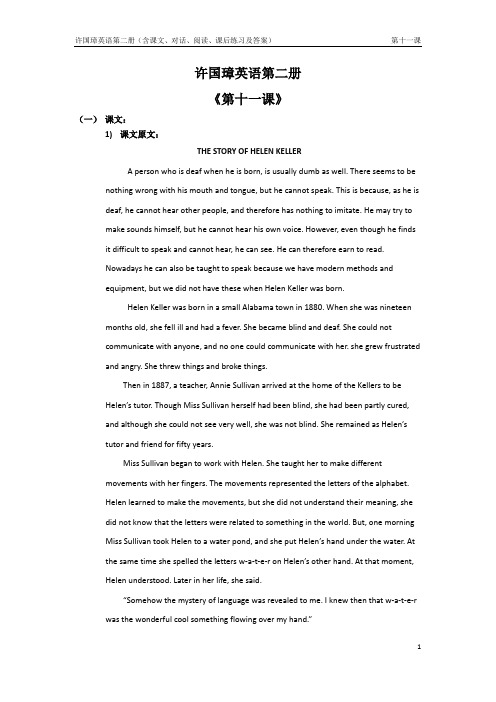
许国璋英语第二册《第十一课》(一)课文:1)课文原文:THE STORY OF HELEN KELLERA person who is deaf when he is born, is usually dumb as well. There seems to benothing wrong with his mouth and tongue, but he cannot speak. This is because, as he is deaf, he cannot hear other people, and therefore has nothing to imitate. He may try tomake sounds himself, but he cannot hear his own voice. However, even though he findsit difficult to speak and cannot hear, he can see. He can therefore earn to read.Nowadays he can also be taught to speak because we have modern methods andequipment, but we did not have these when Helen Keller was born.Helen Keller was born in a small Alabama town in 1880. When she was nineteen months old, she fell ill and had a fever. She became blind and deaf. She could notcommunicate with anyone, and no one could communicate with her. she grew frustrated and angry. She threw things and broke things.Then in 1887, a teacher, Annie Sullivan arrived at the home of the Kellers to be Helen’s tutor. Though Miss Sullivan herself had been blind, she had been partly cured,and although she could not see very well, she was not blind. She remained as Helen’stutor and friend for fifty years.Miss Sullivan began to work with Helen. She taught her to make different movements with her fingers. The movements represented the letters of the alphabet.Helen learned to make the movements, but she did not understand their meaning, shedid not know that the letters were related to something in the world. But, one morningMiss Sullivan took Helen to a water pond, and she put Helen’s hand under the water. Atthe same time she spelled the letters w-a-t-e-r on Helen’s other hand. At that moment,Helen understood. Later in her life, she said.“Somehow the mystery of language was revealed to me. I knew then that w-a-t-e-r was the wonderful cool something flowing over my hand.”Helen was smart and learned quickly. Soon she knew many words. When she was eight years old, she went to a school for the blind in Boston, and she learned to read books written for blind people., she even went to college and had a full education.She wrote many books, too. Although other people had written books about her, people agreed her own books are the ones that best explain how it feels to be deaf, dumb and blind. Her best book is the Story of My Life. Perhaps you have read it. Though it was written in 1902, it still is a very exciting book. Even if you have not read it, you may have heard of Helen Keller.2)全文译文:海伦•凯勒的故事一个人在出生时就耳聋的话,一般他也会是个哑巴。
新编许国璋英语(第二册)
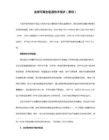
载客量
velocity
n.速度
supertrain
n.超级火车
electricity
n.电;电流
on the basis of
就…而论
overall cost
包干成本
performance
n.性能
edge
n.优势
sales campaign
n.厕所;洗手间
without
没有;不(接动名词)
declare
v.宣告
break out
爆发
on its part
在美国方面
drop
vt.丢;投掷
atom bomb
n.原子弹
Hiroshima
n.广岛
Nagasaki
n.长崎
thereupon
conj.因此;随即
manicure
vt.修剪
shaded
a.林荫遮蔽的
owe...to
归功于…
prolonged prosperity
长期的繁荣
statesmanship
n.治理国家的才能
premier
n.总理
shrewd
a.精明的
resolute
a.果断的
frugal private life
对…起作用
to be more precise
更确切地说
factors in education and mana
教育与经营方面的因素
entrepreneur
n.企业家
第十一课11我们都是留学生

•
14
Learn to write
• • • • • 住 办 公 室 手 在 呢 道 话 机
家 知 电 号
15
• 在陈述句句尾加上表示疑问的语气助词“ 吗”,构成汉语的是非问句。 你是中国人吗? 那是银行吗? 你是印尼人吗? 这些是包子吗? 你是老师吗? 这是耳朵吗? 你是学生吗? 她回家了吗? 你们都是留学生吗? 他回学校吗? 这是书吗? 你懂了吗?
8
副词“也”和“都”
3
课文(三)你也是中国人吗
爱德华: 他是中国人吗? 李昌浩: 是。 爱德华: 你也是中国人吗? 李昌浩: 不是。我是韩国人。 爱德华: 对不起。 李昌浩: 没什么。
4
生词
1. 2. 3. 4. 5. 6. 秘书 先 介绍 一下儿 位 教授 7. 校长 8. 欢迎 9. 留学生 留学 10. 也
我们都是留学生
课文(一)这位是王教授
秘书给校长介绍王教授……
秘书: 我先介绍一下儿,这位是王教授。 这是马校长。 校长: 欢迎您,王教授。 王教授: 谢谢!
2
课文(二)我们都是留学生
A: 你是留学生吗? B: 是。 A: 罗兰也是留学生吗? B: 她也是留学生。我们都是留学生。 A: 张东喝田芳也都是留学生 吗? B: 不,他们俩不是留学生。他们都是中国学 生。
5
生词 11. 我们 你们 他们 15. 学生
12. 都 13. 和 14. 俩 16. 没什么
6
专名
1.马 2.田芳 3.罗兰 4.爱德华
7
“……吗?”
(完整word版)许国璋英语第二册第十三课课文、对话、练习
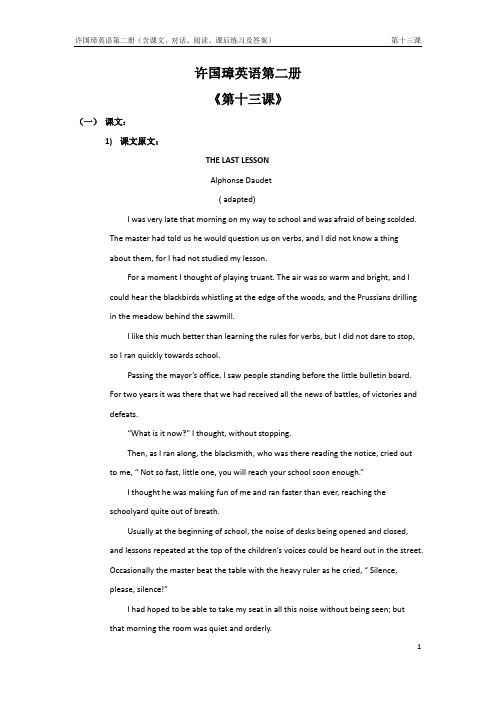
许国璋英语第二册《第十三课》(一)课文:1)课文原文:THE LAST LESSONAlphonse Daudet( adapted)I was very late that morning on my way to school and was afraid of being scolded.The master had told us he would question us on verbs, and I did not know a thingabout them, for I had not studied my lesson.For a moment I thought of playing truant. The air was so warm and bright, and I could hear the blackbirds whistling at the edge of the woods, and the Prussians drillingin the meadow behind the sawmill.I like this much better than learning the rules for verbs, but I did not dare to stop,so I ran quickly towards school.Passing the mayor’s office, I saw people standing before the little bulletin board.For two years it was there that we had received all the news of battles, of victories anddefeats.“What is it now?” I thought, without stopping.Then, as I ran along, the blacksmith, who was there reading the notice, cried out to me, “ Not so fast, little one, you will reach your school soon enough.”I thought he was making fun of me and ran faster than ever, reaching theschoolyard quite out of breath.Usually at the beginning of school, the noise of desks being opened and closed, and lessons repeated at the top of the children’s voices could be heard out in the street.Occasionally the master beat the table with the heavy ruler as he cried, “ Silence,please, silence!”I had hoped to be able to take my seat in all this noise without being seen; butthat morning the room was quiet and orderly.Through the open window I saw my schoolmates already in their places. The master was walking up and down the room with the iron ruler under his arm and a book in his hand.As I entered he looked at me kindly, and said, without scolding,” Go quickly to your place, little Franz; we were going to begin without you. You should have been here five minutes ago.”I climbed over my bench and sat down at once at my desk. Just then I noticed, for the first time, that our master wore his fine green coat and his black silk embroidered cap.But what surprised me most was to see some of the village people seated on the benches at the end of the room. One of them was holding an old spelling book on his knee; and they all looked sadly at the master.While I was wondering at this, our schoolmaster took his place. “ Children,” he said, “ this is the last time that I shall give you a lesson. An order has come from Berlin that no language but German may be taught in the schools of Alsace and Lorraine. A new master will come tomorrow who will teach you German. Today is your last lesson in French. I beg you to pay attention.”These words frightened me. This was what they had posted on the bulletin board then! This was what the blacksmith was reading!(to be continued)2)全文译文:最后一课阿方斯·都德(改写)那天早上我很晚才去上学,心中害怕要挨训斥。
许国璋英语第二册第四课课文、对话、练习、答案

许国璋电视英语教学第二册《第四课》(一)课文:1)课文原文:AN OUTINGWe were discussing where to go for an outing during the spring holidays. Some suggested the Guanting Reservoir. Others wanted to see the Great Wall. Then someonesaid: “ Why not go back to Anzhuang for a visit?”At this we all cheered. Of course, we would revisit that beautiful mountain village on the banks of the Yongding River!The place was dear to us all. We had gone there the year before to plant trees in the surrounding mountains. We had formed close ties with the villagers.So early next morning we were off to Anzhuang on the 7:30 train. It was a fine day in April. Everyone was in high spirits. We could hardly sit still, for there were so manyinteresting sights outside the windows. We saw new factories and well-cultivated fieldsall along the line. At Shijingshan we passed the huge steel mill and the power plant. Then suddenly we saw the green Yongding River in the valley below. Our hearts gave a leap,for we knew that in a few minutes we would be with our friends at Anzhuang again.They were overjoyed to see us. The old villagers kept asking how we were. They were pleased to see how much stronger some of us had become. Then some old friends of ours took us to see what they had achieved. New houses, larger schools, more sheep, more pigs and chickens, more cows and horses – everywhere we saw signs of prosperity.Then we climbed the mountains. The villagers showed us the trees we had planted. Wewere happy to see that most of them were growing well. At one place we found someyoung people digging pits. They were getting things ready for this year’s tree-planting.We all joined them in the work.But the time soon came for us to return. It was getting dark.We told our friends that we would soon come back to plant trees again.Back in the train, we told each other what a wonderful time we had had that day.“An outing like this is certainly more exciting than picnicking in the Summer Palace,”one comrade said.“ Or on the Great Wall,” another added.They spoke for us all.一次效游我们正在讨论在春假期间去哪里郊游。
国学经典诵读第二册第十一单元( 修身篇 )

修身篇修身的本质是一个长期与自己的恶习和薄弱意志作斗争的过程,时时检束自己的身心言行,用诚心、仁爱、谦卑的情操来祛除掉思想中的杂质,对治那些令我们轻浮、骄傲、自大、邪僻的外因、内因。
修身最切实的办法就是择善而交,通过善友相互勉励来增长德行,培养志趣,用最朴实无华的态度切磋关于仁爱的学问。
一定要远避世俗的虚谈,那些好卖弄学问的、巧言乱德的、文过饰非的,还有诸如攀比、争竞、夸耀、淫词、妄语、戏笑都要远离,这些事物唯有叫人败坏。
论语1、子曰:“君子怀德,小人怀土;君子怀刑,小人怀惠。
”【译文】孔子说:“君子心怀道德,小人却一心想着自己的田土;君子心怀法度,小人却一心贪图实惠。
”2、子曰:“不患无位,患所以立;不患莫己知,求为可知也。
”【译文】孔子说:…不怕没有官位,怕的是没有担任官位的才能;不怕没有人知道自己,只求足以让人知道的本事。
”3、子曰:“君子喻于义,小人喻于利。
”【译文】孔子说:“君子懂得的是义,小人懂得的是利。
”4、子曰:“以约失之者鲜矣。
”【译文】孔子说:“因为严于律己而犯错误的是很少的。
”————《里仁篇》5、子曰:“贤哉回也,一箪食,一瓢饮,在陋巷,人不堪其忧,回也不改其乐。
贤哉回也。
”【译文】孔子说:“颜回的品质是多么高尚啊!一箪饭,一瓢水,住在简陋的小屋里,别人都忍受不了这种穷困清苦,颜回却没有改变他好学的乐趣。
颜回的品质是多么高尚啊!”6、子曰:“质胜文则野,文胜质则史。
文质彬彬,然后君子。
”【译文】孔子说:“质朴多于文采,就像个乡下人,流于粗俗:文采多于质朴,就流于虚伪、浮夸。
只有质朴和文采配合恰当,才是个君子。
”7、子曰:“知之者不如好之者,好之者不如乐之者。
”【译文】孔子说:“懂得它的人,不如爱好它的人;爱好它的人,又不如以它为乐的人。
”8、子曰:“默而识①之,学而不厌,诲人不倦,何有于我哉?”【注释】①识:音志,记住。
【译文】孔子说:“默默地记住(所学的知识),学习不觉得厌烦,教人不知道疲倦,这对我能有什么困难呢?”9、子曰:“饭疏食饮水,曲肱而枕之,乐亦在其中矣。
许国璋英语第二册第六课课文、对话、练习、答案

许国璋英语第二册《第六课》(一)课文:1)课文原文:LIFE AT GATESHEAD HALLIt was a cold winter day. The wind had brought dark clouds and heavy rain, so it was impossible to take a walk. Eliza, john and Georgiana were gathered round theirmother in the sitting-room. She lay on a sofa by the fireside, looking perfectly happywith her darlings about her. But she told me not to come near them because I was nota good child.I went to a small room next to the drawing-room. Taking a book from a bookcase, Iclimbed up into the window-seat. Here I sat behind the curtains and started reading. Iwas quite happy until I heard the voice of John Reed.“ Where is she?” he said, calling to his sisters, “ Eliza!Georgiana! Jane is not here.”I was glad that I had drawn the curtains, and I prayed that I should not bediscovered. But Eliza was quicker than John. She said at once: “She is in thewindow-seat of course.”I came out immediately. “ What do you want?” I asked.“Say ‘ What do you want, Master Reed’,” was his reply.” I want you to come here,”he added. And he sat down in an armchair.John Reed was a school-boy of fourteen: four years older than I, for I was only ten.He was big and stout for his age, with a large face and an unhealthy skin. John had notmuch love for his mother and sisters, but he really hated me. As I came up to his chair,he spent about three minutes in putting out his tongue at me. Then he hit me suddenlyand hard.“ What were you doing behind the curtains?”“ I was reading.”“ Show me the book.”First he put out his tongue at Jane and hit her hard. A little while later, he knockedher over with a book and grasped her hair and shoulder.I returned to the window and brought the book. “ You have no business to read our books,” John Reed continued. “ You are a dependent, Mama says. Your father left you no money. You ought to beg, and not live with a gentleman’s children. Go and stand by the door.”I did so. I turned round and saw that he was going to throw the book at me; I tried to avoid it, but it was too late. I was knocked over and fell against the door, striking my head and cutting it badly. The pain was very sharp.“Wicked, cruel boy!”I said. “You are like a murderer –you are like a slave-driver!”“ What!” he cried. “ What did you say to me? Did you hear her, Eliza and Georgiana? I’ll tell Mama. But first –“He ran at me and grasped my hair and my shoulder. But I was desperate now. I don’t know what I did with my hands, but I heard him cry for help.Mrs. Reed came. “ Take her away to the red room and lock her in,” she said. Four hands then quickly carried me upstairs.“For shame!” cried the maid. “ To strike a gentleman, your young master!”“ Master? How is he my master? Am I a servant?”“ you ought to know, miss,” said the nurse, “ that you owe much to Mrs. Reed. She keeps you. If she turns you away, you will have to go to the poor-house.”These words were not new to me; so I did not answer.( Adapted from Jane Eyre by Charlotte Bronte)2)课文译文:盖茨海德庄园生活那是一个寒冷的冬日。
许国璋英语第二册第五课(含课文、对话、阅读、课后练习及答案)
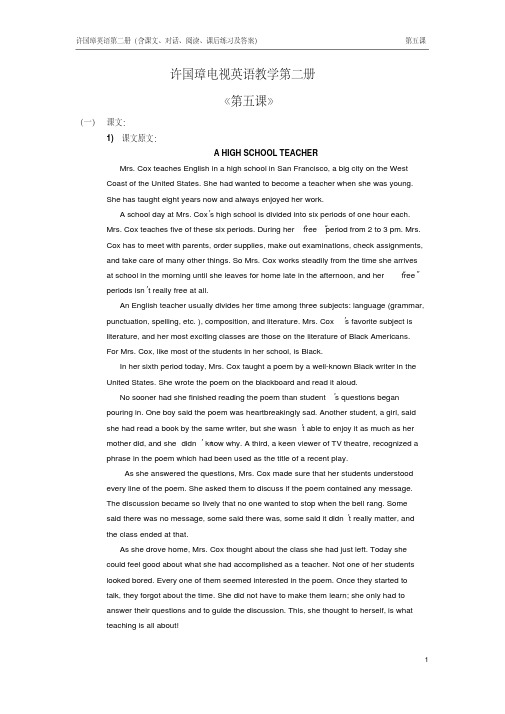
许国璋电视英语教学第二册《第五课》(一)课文:1)课文原文:A HIGH SCHOOL TEACHERMrs. Cox teaches English in a high school in San Francisco, a big city on the West Coast of the United States. She had wanted to become a teacher when she was young.She has taught eight years now and always enjoyed her work.A school day at Mrs. Cox’s high school is divided into six periods of one hour each.Mrs. Cox teaches five of these six periods. During her “free “ period from 2 to 3 pm. Mrs.Cox has to meet with parents, order supplies, make out examinations, check assignments, and take care of many other things. So Mrs. Cox works steadily from the time she arrivesat school in the morning until she leaves for home late in the afternoon, and her “free”periods isn’t really free at all.An English teacher usually divides her time among three subjects: language (grammar, punctuation, spelling, etc. ), composition, and literature. Mrs. Cox’s favorite subject isliterature, and her most exciting classes are those on the literature of Black Americans.For Mrs. Cox, like most of the students in her school, is Black.In her sixth period today, Mrs. Cox taught a poem by a well-known Black writer in the United States. She wrote the poem on the blackboard and read it aloud.No sooner had she finished reading the poem than student’s questions began pouring in. One boy said the poem was heartbreakingly sad. Another student, a girl, saidshe had read a book by the same writer, but she wasn’t able to enjoy it as much as hermother did, and she didn’tknow why. A third, a keen viewer of TV theatre, recognized a phrase in the poem which had been used as the title of a recent play.As she answered the questions, Mrs. Cox made sure that her students understood every line of the poem. She asked them to discuss if the poem contained any message.The discussion became so lively that no one wanted to stop when the bell rang. Somesaid there was no message, some said there was, some said it didn’t really matter, andthe class ended at that.As she drove home, Mrs. Cox thought about the class she had just left. Today she could feel good about what she had accomplished as a teacher. Not one of her studentslooked bored. Every one of them seemed interested in the poem. Once they started totalk, they forgot about the time. She did not have to make them learn; she only had toanswer their questions and to guide the discussion. This, she thought to herself, is whatteaching is all about!2)原文译文:一位高中教师考克斯夫人在美国西海岸一座大城市旧金山的一所高中教英语。
许国璋英语第二册第十四课课文、对话、练习
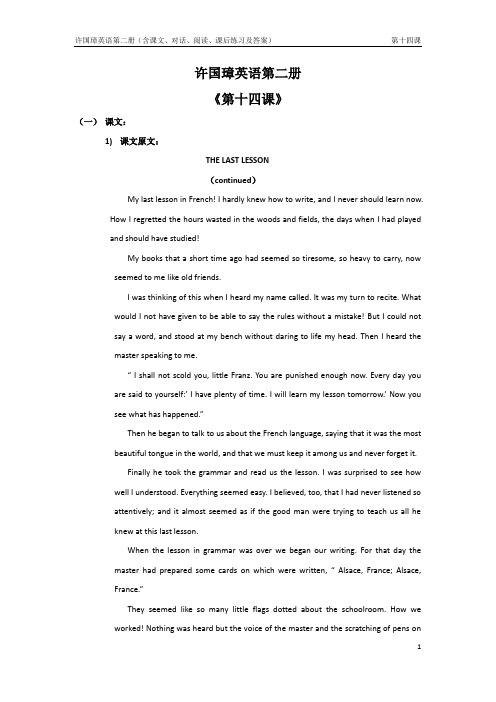
许国璋英语第二册《第十四课》(一)课文:1)课文原文:THE LAST LESSON(continued)My last lesson in French! I hardly knew how to write, and I never should learn now.How I regretted the hours wasted in the woods and fields, the days when I had playedand should have studied!My books that a short time ago had seemed so tiresome, so heavy to carry, now seemed to me like old friends.I was thinking of this when I heard my name called. It was my turn to recite. Whatwould I not have given to be able to say the rules without a mistake! But I could notsay a word, and stood at my bench without daring to life my head. Then I heard themaster speaking to me.“ I shall not scold you, little Franz. You are punished enough now. Every day you are said to yourself:’ I have plenty of time. I will learn my lesson tomorrow.’ Now yousee what has happened.”Then he began to talk to us about the French language, saying that it was the most beautiful tongue in the world, and that we must keep it among us and never forget it.Finally he took the grammar and read us the lesson. I was surprised to see how well I understood. Everything seemed easy. I believed, too, that I had never listened soattentively; and it almost seemed as if the good man were trying to teach us all heknew at this last lesson.When the lesson in grammar was over we began our writing. For that day the master had prepared some cards on which were written, “Alsace, France; Alsace,France.”They seemed like so many little flags dotted about the schoolroom. How we worked! Nothing was heard but the voice of the master and the scratching of pens onpaper. There was no time for play now. on the roof of the schoolhouse some pigeons were softly cooing, and I said to myself, “Will they, too, be obliged to sing in German?”From time to time, when I looked up from my page, I saw the master looking about him as if he wished to impress upon his mind everything in the room.After writing, we had a history lesson. Next, the little ones recited in concert their “Ba, be, be, bo, bu”.Oh, I shall always remember that last lesson!Suddenly the church clock struck twelve. The master rose from his chair. “My friends,” said he, “my friends, …i…i…”But something choked him; he could not finish the sentence. He returned to the blackboard, took a piece of chalk, and wrote in large letter, “VIVE LA FRANCE.”Then he stood leaning against the wall, unable to speak. He signed to us with his hand. “ The lesson is over. You are dismissed.”2)全文译文:最后一课(续)我最后一次上法语课了!我几乎还不会作文呢,就再也不能学了。
许国璋英语第二册第八课课文、对话、练习
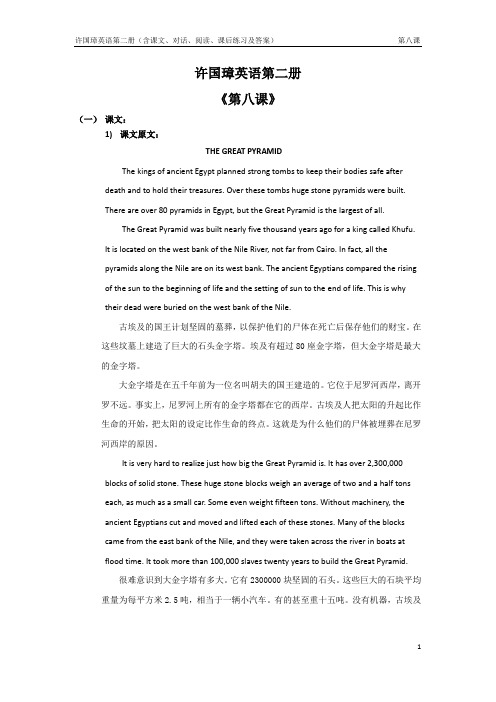
许国璋英语第二册《第八课》(一)课文:1)课文原文:THE GREAT PYRAMIDThe kings of ancient Egypt planned strong tombs to keep their bodies safe after death and to hold their treasures. Over these tombs huge stone pyramids were built.There are over 80 pyramids in Egypt, but the Great Pyramid is the largest of all.The Great Pyramid was built nearly five thousand years ago for a king called Khufu.It is located on the west bank of the Nile River, not far from Cairo. In fact, all thepyramids along the Nile are on its west bank. The ancient Egyptians compared the rising of the sun to the beginning of life and the setting of sun to the end of life. This is whytheir dead were buried on the west bank of the Nile.古埃及的国王计划坚固的墓葬,以保护他们的尸体在死亡后保存他们的财宝。
在这些坟墓上建造了巨大的石头金字塔。
埃及有超过80座金字塔,但大金字塔是最大的金字塔。
大金字塔是在五千年前为一位名叫胡夫的国王建造的。
它位于尼罗河西岸,离开罗不远。
事实上,尼罗河上所有的金字塔都在它的西岸。
许国璋英语第二册第十课课文、对话、练习题、答案
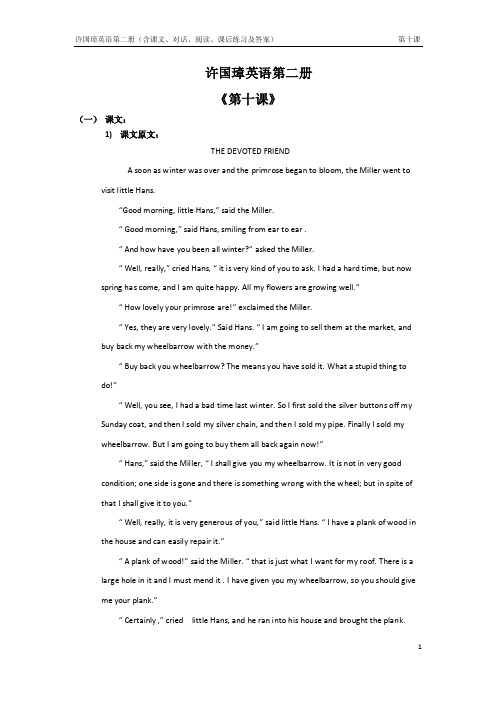
许国璋英语第二册《第十课》(一)课文:1)课文原文:THE DEVOTED FRIENDA soon as winter was over and the primrose began to bloom, the Miller went tovisit little Hans.“Good morning, little Hans,” said the Miller.“ Good morning,” said Hans, smiling from ear to ear .“ And how have you been all winter?” asked the Miller.“ Well, really,” cried Hans, “ it is very kind of you to ask. I had a hard time, but now spring has come, and I am quite happy. All my flowers are growing well.”“ How lovely your primrose are!” exclaimed the Miller.“ Yes, they are very lovely.” Said Hans. “ I am going to sell them at the market, and buy back my wheelbarrow with the money.”“ Buy back you wheelbarrow? The means you have sold it. What a stupid thing to do!”“ Well, you see, I had a bad time last winter. So I first sold the silver buttons off my Sunday coat, and then I sold my silver chain, and then I sold my pipe. Finally I sold mywheelbarrow. But I am going to buy them all back again now!”“ Hans,” said the Miller, “ I shall give you my wheelbarrow. It is not in very good condition; one side is gone and there is something wrong with the wheel; but in spite of that I shall give it to you.”“ Well, really, it is very generous of you,” said little Hans. “ I have a plank of wood in the house and can easily repair it.”“ A plank of wood!” said the Miller. “ that is just what I want for my roof. There is a large hole in it and I must mend it . I have given you my wheelbarrow, so you should give me your plank.”“ Certainly ,” cried little Hans, and he ran into his house and brought the plank.“ And now as I have given you my wheelbarrow, I am sure you will give me some flowers in return. Here is the basket. Fill it quite full.”“Quite full?” said little Hans. It was really a very big basket, and he knew that he had to pick all his flowers to fill it. He looked sad. But the Miller told him that true friends must not be selfish, so little Hans ran and picked all his pretty primroses and filled the Miller’s basket.“ Good-bye, little Hans,” said the miller as he went up the hill with the plank on his shoulder. And the big basket in his hand.The next day the Miller came and asked Hans to carry a sack of flour to the market and sell it for him. The day after, he asked him to mend his roof for him. So little Hans did one thing after another for the Miller and the Miller said all kinds of beautiful things about friendship.One evening little Hans was sitting near the fire when he heard a loud knock at the door. It was a very cold night and a terrible wind was blowing. He ran to the door and there stood the Miller with a lantern in his hand.“ Dear little Hans, “ cried the Miller,” my little boy has fallen from a ladder and hurt himself. I am going for the doctor, but he lives so far away, and it is such a bad night that I have decided to ask you to go instead. You know I am going to give you my wheelbarrow, and you must do something for me in return.”“ Certainly,” cried Little Hans. “ I shall start at once, but you must give me your lantern; the night is so dark that I am afraid I may fall into a ditch.”“ I am sorry,” answered the Miller, “ but it is my new lantern, and I am afraid something may happen to it.”“ Well, never mind, I shall go without it ,” cried little Hans and he put on his coat and hat and set off.It was a stormy night. It was so black that little Hans could hardly see anything, and the wind was so strong that he found it difficult to stand on his feet. It was raining harder and harder. Little Hans lost his way. He fell into a deep hole full of water and was drowned. The next day some goatherds found his body and brought it to the cottage.Everybody went to little Hans’ funeral. The Miller walked at the head of the procession in a long black coat, saying:” I was his best friend, so it’s only right that I should be the chief mourner.” And every now and then he wiped his eyes with a big handkerchief.2)译文:忠实的朋友(续)冬天一过,樱草花刚一开,磨坊主就去看望小汉斯了。
- 1、下载文档前请自行甄别文档内容的完整性,平台不提供额外的编辑、内容补充、找答案等附加服务。
- 2、"仅部分预览"的文档,不可在线预览部分如存在完整性等问题,可反馈申请退款(可完整预览的文档不适用该条件!)。
- 3、如文档侵犯您的权益,请联系客服反馈,我们会尽快为您处理(人工客服工作时间:9:00-18:30)。
Helen Keller was born in a small Alabama town in 1880. When she was nineteen months old, she fell ill and had a fever. She became blind and deaf. She could not communicate with anyone, and no one could communicate with her. She grew frustrated and angry. She threw things and broke things.
海伦·凯勒的故事
一个人在出生时就耳聋的话,一般他也会是个哑巴。他的嘴和舌好像没有什么毛病,可是却讲不出话来。这是因为,一个聋人听不见别人讲话,因此没有可模仿的东西。也许他会摸索着发出声音,但他却听不到自己的声音。不过,尽管他觉得讲话有困难,又听不见,但是他能看见,因此他可以学会看书识字。今天,我们可以通过现代化的方法与仪器设备帮助他学会讲话。但海伦·凯勒出生时这些条件都不具备。
Then in 1887, a teacher, Annie Sullivan arrived at the home of the Kellers to be Helen's tutor. Though Miss Sullivan herself had been blind, she had been partly cured, and although she could not see very well, she was not blind. She remained as Helen's tutor and friend for fifty years.
Miss Sullivan began to work with Helen. She taught her to make different movements with her fingers. The movements represented the letters of the alphabet. Helen learned to make the movements, but she did not understand their meaning. She did not know that the letters were related to something in the world. But, one morning Miss Sullivan took Helen to a water pond, and she put Helen's hand under the water. At the same time she spelled the letters w-a-t-e-r on Helen's other hand. At that moment, Helen understood. Later in her life, she said, "Somehow the mystery of language then that w-a-t-e-r was the wonderful cool something flowing over my hand."
1880年,海伦·凯勒出生在阿拉巴马州的一个小镇上。她出生19个月后得了场病,发起高烧,变得又盲又聋。她无法与任何人交流,别人也无法与她交流。她变得又沮丧、又气恼,乱扔、乱摔东西。
后来在1887年,一位叫安妮·萨莉文的教师来到海伦家里作她的家庭教师。萨莉文小姐自己过去也曾失明,但她已经恢复了一些视力,尽管她的视力不算好,但算不上盲人。在以后的那五十年里,她一直是海伦的朋友兼家庭教师。
萨莉文小姐开始教海伦用手指比划出各种动作。不同的动作代表不同的字母。海伦学会了比划,但她并没有明白其中的含义。她不知道那些字母与世上实物之间有联系。直到一天早晨,萨莉文小姐带着海伦来到一个池塘边,她把海伦的手放进水里,同时在海伦另一只手上拼出“水”这个单词的字母“w-a-t-e-r”。就在那一刻,海伦明白了。后来海伦提及此事说:“语言之谜就这样被解开了。那时我才知道w-a-t-e-r这些字母原来就是在我手中流过的那凉爽、美妙的东西。”
海伦天资聪颖,学得很快。不久她就学会了很多单词。8岁时她来到波士顿市的一所盲人学校上学,学会了阅读那些专给盲人出的书。后来她甚至还进了大学,接受了全面的教育。
她还著有很多书。尽管别人也写了她的传记,但大家一致认为她的自传最能体现一个又聋、又哑、又盲的人的切身感受。她写得最好的作品是《我的一生》。也许你读过了。书是1902年写成的,但至今仍是一本很振奋人心的书。即使你从没读过这本书,也该听说过海伦·凯勒吧。
THE STORY OF HELEN KELLER
A person who is deaf when he is born, is usually dumb as well. There seems to be nothing wrong with his mouth and tongue, but he cannot speak. This is because, as he is deaf, he cannot hear other people, and therefore has nothing to imitate. He may try to make sounds himself, but he cannot hear his own voice. However, even though he finds it difficult to speak and cannot hear, he can see. He can therefore learn to read. Nowadays he can also be taught to speak because we have modern methods and equipment, but we did not have these when Helen Keller was born.
Helen was smart and learned quickly. Soon she knew many words. When she was eight years old, she went to a school for the blind in Boston, and she learned to read books written for blind people. She even went to college and had a full education.
